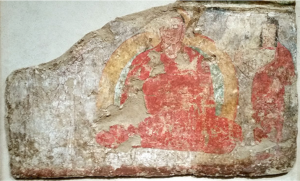The Young Buddhist Association of Indonesia (YBA) recently co-hosted an interfaith dialogue on religious moderation that explored the question: does religious moderation conflict with religious teachings? The event, co-organized by the religious educational program Pendidikan Studi Agama, drew together figures from Indonesia’s Buddhist, Christian, and Hindu communities. The dialogue was hosted by artist and story ambassador William Umboh of the Habibie Center, an independent NGO working to advance modernization and democratization in Indonesia based on cultural integrity and religious values.
The Young Buddhist Association (YBA) is the leading Buddhist youth organization in Indonesia. Through a deeply held conviction in the Buddha’s message of compassion, growth, and liberation, the association promotes a positive lifestyle among the young in order to cultivate a society founded on wisdom, compassion, and gratitude. The association is involved in establishing Buddhist organizations nationwide, propagating the study of the Dharma among young people, and providing leadership training.

Buddhist leader Bhikkhu Dhammasubho Mahathera noted that in the teachings of Shakyamuni Buddha are based on the Middle Way (Pali: Majjhimapatipada), which avoids extremes.
“Siddhartha, who was the son of a king and an only child, left behind his life of luxury, because he was an anti-establishment person, and underwent various forms of asceticism,” Bhikku Dhammasubho Mahathera said.
He explained that after enduring various privations, the Buddha finally found a middle way between extraordinary luxury and extraordinary self-mortification that is characterized by the Noble Eightfold Path consisting of: right understanding, right intention, right speech, right conduct, right livelihood, right effort, right mindfulness, and right concentration. “According to the Buddha, these eight elements are right for oneself, right for others, and right for the environment, so that with this right understanding there will be no more conflict in anything,” he emphasized.
Speaking on behalf of the Christian community, Pastor Aryanto Nugroho expressed his view that Jesus Christ lived among Jews who were very sectarian and antipathetic toward non-Jews, and hence, he carried out reforms between Jewish and non-Jewish communities: “Jesus Christ taught that a religious relationship with God does not require us to cut ties with our fellow human beings. Those who are Unitarian Christians have the view that God is truly one. If there is only one God who is worshiped by all humans, of course, salvation is not owned by one particular religious institution. . . . As such, we and other people may wear different clothes, but the point is we all worship the one God.”
Meanwhile, Hindu leader K. A. Widiantara, chair of Acarya Media Nusantara, stated that while the teachings of monks and priests of various religious differed in form, they were, in fact, very similar in substance.
He examined religious moderation from the Hindu perspective, referring to the traditional concept of “Tri Hita Karana,” which emphasizes harmony with God, harmony among people, and harmony with nature, which demonstrates how people can live side by side, full of tolerance and full of peace: “Tri Hita Karana is what causes us to live in this world in harmony, regardless of background. In our teachings, we teach that all living things are brothers and sisters; the point here is tolerance,” he said.
The chairman of the Young Buddhist Association of Indonesia, Limanyono Tanto, expressed gratitude to the participants for the event, noting that the YBA was itself open and inclusive organization, supporting all activities for religious moderation: “And with this religious moderation we are able to spread the teachings of Buddhism and strengthen friendships with our brothers and sisters among the religious people of Indonesia.”

Although officially a secular state, Indonesia is home to a diversity of communities and religious and spiritual traditions. Islam is the most widespread religion, observed by 86.7 per cent of the population, according to national data for 2018. Christian traditions account for a combined 10.7 per cent, Hinduism 1.7 per cent, and Confucianism, folk, and other traditions account for a combined 0.08 per cent.
Buddhism, practiced by 0.8 per cent of the population—roughly two million people—is the second oldest spiritual tradition in Indonesia after Hinduism. According to historical accounts, Buddhism first flourished on the archipelago around the sixth century, which was followed by ascent and decline of a number of powerful Buddhist empires, including the Shailendra dynasty (c. 8th–9th centuries), the Srivijaya empire (c. 7th–12th centuries), and the Mataram empire (c. 8th–11th centuries). Today, the majority of Indonesian Buddhists are affiliated with Mahayana schools of Buddhism, although communities of Theravada and Vajrayana practitioners also exist.
See more
Young Buddhist Association of Indonesia
Young Buddhist Association (YBA) of Indonesia (Instagram)
Young Buddhist Association of Indonesia (Facebook)
studiagama.id (Instagram)
The Habibie Center
Related news reports from BDG
Young Buddhist Association of Indonesia Celebrates Vesak in the Spirit of Social Harmony
Young Buddhist Association of Indonesia and Rumi Institute Organize an Interfaith Dialogue on “Religion of Love”
Young Buddhist Association of Indonesia Holds Interfaith Dialogue on Women and Spirituality
Young Buddhist Association of Indonesia Hosts National Workshop on Religious Moderation
Young Buddhist Association of Indonesia Holds “Mindful Festival 2022” to celebrate Kathina Tradition and Interfaith Harmony
Young Buddhist Associations of Indonesia and Malaysia Hold Online Forum on the Dangers of Radicalism and Extremism











